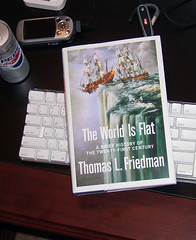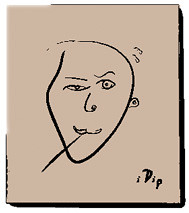
Many authors hate to go on grinding book tours. But I've always found it a useful way to be a foreign correspondent in America and take the pulse of the country. Here are the two most important things I learned from a recent book tour:
First, many educated people seem to be getting their news from Comedy Central. Say what? As any author will tell you, the best TV book shows to be on have long been Don Imus, Charlie Rose, C-Span, Tim Russert on CNBC, "Today," Oprah and selected programs on CNN, Fox and MSNBC. They are all still huge. But what was new for me on this tour was the number of people who also mentioned getting their news from Jon Stewart's truly funny news satire, "The Daily Show." And I am not just talking about college kids. I am talking about grandmas. Just how many people are now getting their only TV news from Comedy Central is not clear to me - but it is a lot, lot more than you think.

Second, and this may be related to the first, there's a huge undertow of worry out in the country about how our kids are being educated and whether they'll be able to find jobs in an increasingly flat world, where more Chinese, Indians and Russians than ever can connect, collaborate and compete with us. In three different cities I had parents ask me some version of: "My daughter [or son] is studying Chinese in high school. That's the right thing to do, isn't it?"
Not being an educator, I can't give any such advice. But my own research has taught me that the most important thing you can learn in this era of heightened global competition is how to learn. Being really good at "learning how to learn," as President Bill Brody of Johns Hopkins put it, will be an enormous asset in an era of rapid change and innovation, when new jobs will be phased in and old ones phased out faster than ever.
O.K., one ninth grader in St. Paul asked me, then "what courses should I take?" How do you learn how to learn? Hmm. Maybe, I said, the best way to learn how to learn is to go ask your friends: "Who are the best teachers?" Then - no matter the subject - take their courses. When I think back on my favorite teachers, I don't remember anymore much of what they taught me, but I sure remember being excited about learning it.
What has stayed with me are not the facts they imparted, but the excitement about learning they inspired. To learn how to learn, you have to love learning - while some people are born with that gene, many others can develop it with the right teacher (or parent).
There was a great piece in the April 24 Education Life section of The New York Times that described Britney Schmidt, a student at the University of Arizona who was utterly bored with her courses, mostly because her professors seemed interested only in giving lectures and leaving. "I was getting A's in all my classes, but I wasn't being challenged, and I wasn't thinking about new things," she said.
She had to take a natural science course, though, and it turned out to have a great professor and teaching assistants, who inspired her. "I was lucky," she said. "I took a class from somebody who really cared." The result: a scientist was born. Ms. Schmidt has since been accepted to graduate school at U.C.L.A. in planetary physics and the University of Chicago in cosmo-chemistry.
I just interviewed Craig Barrett, the chief executive of Intel, which has invested millions of dollars in trying to improve the way science is taught in U.S. schools. (The Wall Street Journal noted yesterday that China is graduating four times the number of engineers as the U.S.; Japan, with less than half our population, graduates double the number.)
In today's flat world, Mr. Barrett said, Intel can be a totally successful company without ever hiring another American. That is not its desire or intention, he said, but the fact is that it can now hire the best brain talent "wherever it resides."
If you look at where Intel is making its new engineering investments today, he said, it is in China, India, Russia, Poland and, to a lesser extent, Malaysia and Israel. While cutting-edge talent is still being grown in America, he added, it's not enough for Intel's needs, and not enough is being done in U.S. public schools - not just to leave no child behind, but to make sure that the best students and teachers are nurtured and rewarded.
Look at the attention Congress has focused on steroids in Major League Baseball, Mr. Barrett mused. And then look at the attention it has focused on science education in minor-league American schools.
That's the real news out there, folks. And it's not funny.


